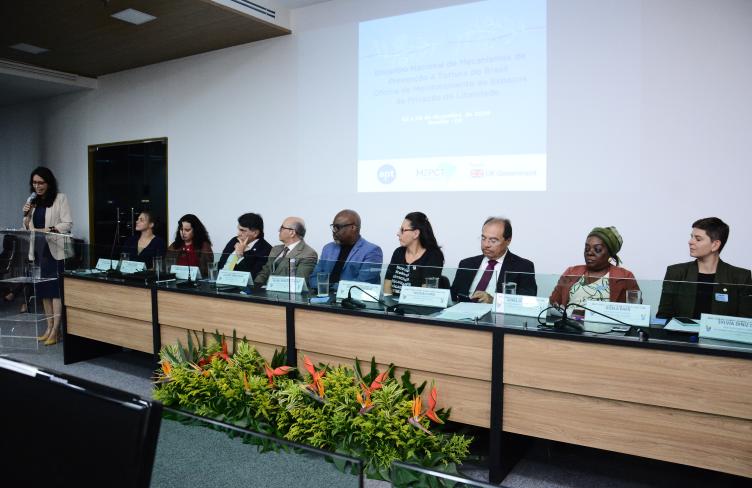
In September 2018, the APT conducted a workshop on monitoring the implementation of detention safeguards, with the Mexican National Preventive Mechanism (NPM) against torture within the National Human Rights Commission (NHRC). The APT also organised a joint seminar with the NHRC to assess the status of implementation of the anti-torture law that entered into force in June 2017.
Detainees are at a particular high risk of suffering abuses during the early stages of detention, before they are brought before a judge. This is particularly true in Mexico, where over three quarters of detainees were subject to physical or psychological mistreatment upon arrest, as the National Survey of Population Deprived of Liberty in Mexico (ENPOL) 2016 revealed.
Based on the national context, as well as on the recent findings that, “independently of the broader political factors, detention safeguards in practice have the highest torture prevention impact,” the APT continued its support programme with the NHRC by training staff of the Mexican NPM within the NHRC to monitor the implementation of four key detention safeguards, namely the rights to:
- Notify family members or other third parties about the arrest,
- Provide prompt access to a lawyer,
- Have access to an independent medical examination, and
- Receive information about their rights.
Together with the APT, the NPM was able to identify the main challenges regarding the implementation of these key safeguards, as a basis for its future work. During the three-day training, the methodology used by the NPM to monitor the implementation of safeguards – including the preparation, conduct and follow-up to visits to places of detention – was discussed in detail.
Jean-Sébastien Blanc, APT's Director of Thematic Programmes presents the methodology of monitoring detention safeguards.
Working session on the preparation of monitoring visits.
The methodology was then applied during a full-day visit to a male prison, as well as to an agency of the Public Prosecutor’s Office where persons are held in the first hours following arrest. At the end of the workshop, the APT met with the NHRC’s Chairperson to share the main outcomes, reiterate APT’s commitment to continue supporting the NPM, and discuss next steps in the cooperation between the two institutions.
APT delegation, composed of APT's Director of Thematic Programmes, Jean-Sébastien Blanc, Director of Regional Programmes, Audrey Olivier Muralt, and Americas Programme Officer, Veronica Filippeschi, meets with the President of the Mexican NHRC, Luis Raúl González Pérez, and the Director of the NPM, Ninfa Delia Domínguez Leal.
“We have witnessed the changes made by the NPM since our first training in January 2018 to better integrate the preventive approach in its methodology and work,” explained Audrey Olivier Muralt, APT’s Director of Regional Programmes. “The NPM team is very motivated and it is inspiring to work with them on monitoring the implementation of detention safeguards, a very important issue,” added Veronica Filippeschi, APT’s Americas Programme Officer.
The mandate of the NPM was integrated in the General Law to Prevent, Investigate and Punish Torture, that entered into force in June 2017. Taking stock on the implementation of the law after one year was the theme of a one day Joint APT/NHRC seminar. Representatives of State institutions – such as public prosecutors, police, judges, public defenders, human rights commissions from different states of Mexico – of the Office of the UN High Commissioners for Human Rights and of civil society organisations, identified both challenges and good practices, and suggested concrete ways forward. In particular, participants raised the needs to:
- Ensure coordination among the main institutions responsible for implementing the law;
- Guarantee the effective participation of civil society; and
- Address the specific needs of persons in situations of vulnerability.
Specific progresses made in the development of the National Torture Prevention Programme and National Registry of Torture were also shared by the relevant authorities, both being explicitly foreseen by the Anti-Torture Law.
For more information on:
- Our work in Mexico, please click here
- Mexico’s implementation of the Optional Protocol to the UN Convention against Torture (OPCAT), please access our OPCAT Database
Opening of the joint APT/NHRC Seminar on the Anti-Torture Law, September 2018.
APT Delegation and part of the Mexican NPM's staff who attended the workshop on monitoring detention safeguards.



